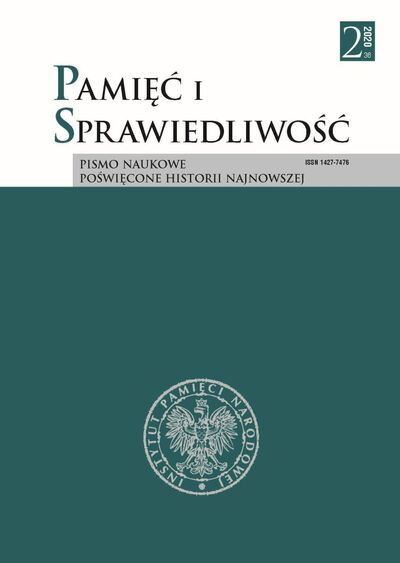Polityka gospodarcza Komunistycznej Partii Węgier w latach 1945–1946
Pamięć i Sprawiedliwość, Tom 36 Nr 2 (2020), strony: 52-69
Data publikacji: 2020-12-31
 https://doi.org/10.48261/PIS203604
https://doi.org/10.48261/PIS203604
Abstrakt
Artykuł przedstawia szczegółową analizę dostępnej powojennej dokumentacji Komunistycznej Partii Węgier (MKP), ukazując działania podejmowane przez partię w latach 1945–1946 z myślą o wywieraniu wpływu na politykę gospodarczą Węgier. W tym okresie komuniści węgierscy opracowali długoterminowy plan stopniowego przejęcia władzy politycznej na Węgrzech z poparciem Sowietów. Przywództwo komunistów węgierskich usiłowało stworzyć politykę gospodarczą, która z ich partii uczyniłaby integralny element procesu stabilizacji, a tym samym zapewniła jej miejsce u szczytów władzy na Węgrzech. Najważniejszymi priorytetami MKP od początku było zdobycie kluczowych pozycji politycznych oraz osłabienie i dezintegracja istniejących struktur społecznych i politycznych. Dla realizacji tego planu Komunistyczna Partia Węgier stworzyła różne „narzędzia”, takie jak Najwyższa Rada Ekonomiczna, której działania były potajemnie uzgadniane z Wydziałem Polityki Państwowej Komunistycznej Partii Węgier.
Bibliografia
Magyar Nemzeti Levéltár Országos Levéltára (National Archives of Hungary)
Politikatörténeti- és Szakszervezeti Levéltár (Archives of the Institute of Political History and Trade Unions)
A Magyar Kommunista Párt és a Szociáldemokrata Párt határozatai 1944–1948 [Resolutions of the Hungarian Communist Party and the Social Democratic Party, 1944–1948], ed. S. Rákosi, B. Szabó (Budapest: Kossuth, 1979).
Iratok a magyar-szovjet kapcsolatok történetéhez. 1944. október – 1948. június. Dokumentumok [Papers for the History of the Hungarian-Soviet Relations. October 1944 – June 1948. Documents], ed. I. Vida (Budapest: Gondolat, 2005).
Pártközi értekezletek. Politikai érdekegyeztetés, politikai konfrontáció 1944–1948 [Inter-party Sessions: Reconciliation of Political Interests and Political Confrontations, 1944–1948], ed. J. Horváth, É. Szabó, L. Szűcs and K. Zalai (Budapest: Napvilág, 2003).
Baráth M., A Kreml árnyékában. Tanulmányok Magyarország és a Szovjetunió kapcsolatainak történetéhez [In the Shadow of the Kremlin: Studies on the History of Relations between Hungary and the Soviet Union] (Budapest: Gondolat, 2014).
Baráth M., Gerő Ernő politikai pályája 1944–1956 [The Political Career of Ernő Gerő, 1944–1956] (Eötvös Lóránd University, 1997).
Borhi L., Hungary in the Cold War 1945–1956: Between the United States and the Soviet Union (Budapest: Central University Press, 2004).
Botos J., “A pengő megsemmisülése, a forint születése, 1938–1946” [The Destruction of the Pengő and the Birth of the Forint, 1938–1946], Múltunk 1 (2016).
Djilas M., Conversations with Stalin (New York: Harcout, Brace & World, 1962).
Germuska P., “Adalékok a magyarországi gazdasági intézményrendszer 1945–1948 közötti változásaihoz” [Supplements to the Economic Institutional System Change in Hungary between 1945 and 1948] [in:] Lépések a gazdasági teljhatalom felé 1945–1948 [Steps towards Absolute Economic Power, 1945–1948], ed. B. Bank, P. Germuska (Budapest: Nemzeti Emlékezet Bizottsága, 2017).
Gyarmati G., A Rákosi-korszak: Rendszerváltó fordulatok évtizede Magyarországon, 1945–1956 [The Rákosi Era: Decade of Change of Regime in Hungary] (Budapest: ÁBTL & Rubicon, 2013).
Korom M., “A moszkvai magyar kommunista emigráció 1944. őszi megbeszélései a programkészítésről” [Discussions of the Hungarian Communist Emigration in Moscow in the Fall of 1944 on the Preparation of a Policy Program], Múltunk 1 (1993).
Kramer M., “Stalin, Soviet Policy, and the Establishment of a Communist Bloc in Europe, 1941–1949” [in:] Imposing, Maintaining, and Tearing Open the Iron Curtain: the Cold War and East Central Europe, 1945–1989, ed. M. Kramer, V. Smetana (Lanham (Md): Rowman & Littlefield, 2014).
Majoros K., “A múlt század jeles magyar közgazdásza: Varga István (1897–1962)” [A Famous Hungarian Economist of the Last Century: István Varga (1897–1962)], KTK/IE Műhelytanulmányok 9 (2003).
Mark E., “Revolution by Degrees, Stalin’s National-Front Strategy for Europe, 1941–1947”, CWIHP 31 (2001).
Rákosi M., “Harcolunk a demokráciáért – egyetlen lépést sem teszünk visszafelé” [We Fight for Democracy – Not One Step Backwards] Szabad Nép (19 II 1946).
Rákosi M., Visszaemlékezések 1940–1956 [Recollections 1940–1956] (Budapest: Napvilág, 1997).
Rákosi S., Az MKP és az MDP szervezeti felépítése, 1944–1956 [The Organizational Structure of the Hungarian Communist Party and the Hungarian Workers’ Party, 1944–1956] (Budapest: MSZMP Párttörténeti Intézete, 1964).
Varga J., A földreform és a közélet demokratizálása [Land Reform and the Democratization of Public Life] (Budapest: Magyar-Szovjet Kulturális Társaság, 1945).
Licencja
Prawa autorskie (c) 2023 Pamięć i Sprawiedliwość

Utwór dostępny jest na licencji Creative Commons Uznanie autorstwa – Użycie niekomercyjne – Bez utworów zależnych 4.0 Międzynarodowe.
 Język Polski
Język Polski
 English
English
 Deutsch
Deutsch
 Français (France)
Français (France)
 Italiano
Italiano
 Русский
Русский


 PDF (English)
PDF (English)




